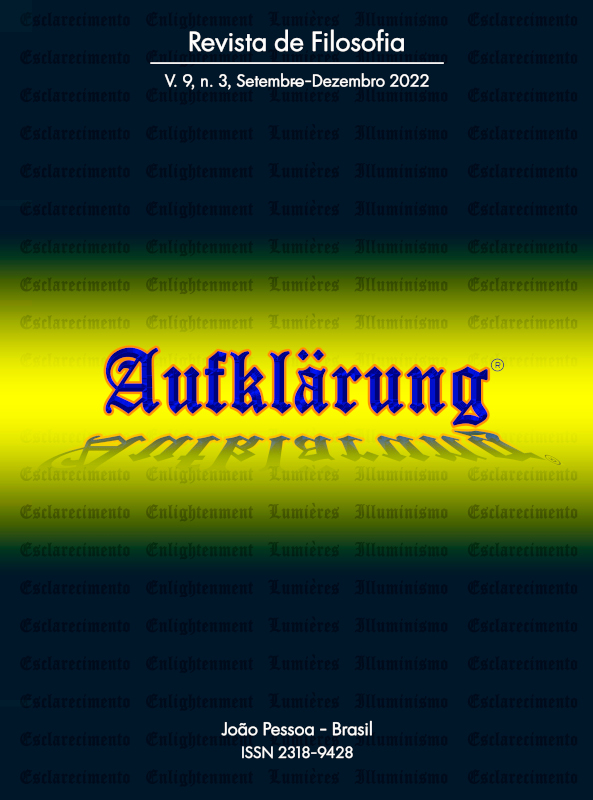Theory of Thomas Aquinas on human nature and its meaning in social life today
DOI:
https://doi.org/10.18012/arf.v9i3.65673Palavras-chave:
Tomás de Aquino, crentes, natureza humana, razão, seres racionaisResumo
International integration is deepening, so people develop in all aspects. In society, communities with individuals have relationships in humans' material and spiritual life. When society grows, more people's knowledge of the world needs to learn so that people can understand themselves and act for the development of society. The article studies the thought of Thomas Aquinas to clarify human nature in social life. The paper uses analytical, synthesis, and argumentative methods to explain human nature with its behaviors and perceptions in social life; Aquinas argued that it is human nature to do the right thing to achieve happiness. However, society is more progressive and liberals, but people always realize their lives have many injustices and difficulties. People want their lives to be happy and good but feel depressed. In this article, in an excellent society, people live according to the law and adjust their behavior according to the regulations of society; each person in the society is also better, from which the society is also humane and reasonable that the basis for building a better society in Vietnam.
Downloads
Referências
Aertsen, Jana. "Aquinas's Philosophy in Its." The Cambridge Companion to Aquinas (1993): 12.
Aroney, Nicholas. "The Social Ontology of Human Dignity." Paper presented at the IVR World Congress of Philosophy of Law and Social Philosophy, Lucerne, Switzerland, 2019.
Arthur, James, Liam Gearon, and Alan Sears. Education, Politics and Religion: Reconciling the Civil and the Sacred in Education. Routledge, 2010.
Cali, Carmelo. "Representation, Internal." In Glossary of Morphology, 451-54: Springer, 2020.
Csák, János. "Social Futuring–a Normative Framework." Society and Economy 40, no. s1 (2018): 21-45.
Di Ceglie, Roberto. Aquinas on Faith, Reason, and Charity. Routledge, 2022.
Finnis, John. Natural Law and Natural Rights. Oxford University Press, 2011.
Gibbs, Paul, Jill Jameson, and Alex Elwick. Values of the University in a Time of Uncertainty. Springer, 2019.
Grassl, Wolfgang. "Aquinas on Management and Its Development." Journal of Management Development (2010).
Haldane, John. "Philosophy in Relation to Other Disciplines Exploring Human Nature." Metaphilosophy (2022).
Hittinger, Russell. "The Recovery of Virtue: The Relevance of Aquinas for Christian Ethics." Faith and Philosophy 8, no. 4 (1991): 549-54.
. Horvat, Saša, Piotr Roszak, and Brian J Taylor. "Is It Harmful? A Thomistic Perspective on Risk Science in Social Welfare." Journal of religion and health (2021): 1-15.
Jenkins, John I. Knowledge and Faith in Thomas Aquinas. Cambridge University Press, 1997.
Johnson, Wayne Gustave. Understanding Morality: Quests for the Good Life. Wipf and Stock Publishers, 2022.
Keys, Mary M. Aquinas, Aristotle, and the Promise of the Common Good. Cambridge University Press, 2006.
Murphy, Mark C. "Natural Law Theory." The Blackwell guide to the philosophy of law and legal theory (2005): 15-28.
Naus, John E. The Nature of the Practical Intellect According to Saint Thomas Aquinas. Gregorian Biblical BookShop, 1959.
Ozoliņš, Jānis T. "Aquinas, Education and the Theory of Illumination." 967-71Taylor & Francis, 2021.
Pasnau, Robert, and Robert Charles Pasnau. Thomas Aquinas on Human Nature: A Philosophical Study of Summa Theologiae, 1a 75-89. Cambridge University Press, 2002.
Perler, Dominik. "Rational Seeing: Thomas Aquinas on Human Perception." In Medieval Perceptual Puzzles, 213-37: Brill, 2019.
Ramsay, Hayden. "Conscience: Aquinas—with a Hint of Aristotle." Sophia 40, no. 2 (2001): 15-29.
Reyna, Zachary Low. "Aquinas's Ecological Vision: Natural Law and Friendship in Contemporary Environmental Political Thought." New Political Science 40, no. 1 (2018): 15-32.
Rhonheimer, Martin. "St. Thomas Aquinas and the Idea of Limited Government." Journal of Markets & Morality 22, no. 2 (2019).
Schaff, Philip. History of the Christian Church. Vol. 3: C. Scribner, 1867.
Stump, Eleonore. Aquinas. Routledge, 2008.
Tück, Jan Heiner. A Gift of Presence: The Theology and Poetry of the Eucharist in Thomas Aquinas. CUA Press, 2018.
Arquivos adicionais
Publicado
Como Citar
Edição
Seção
Licença

Este trabalho está licenciado sob uma licença Creative Commons Attribution 4.0 International License.
Política de Direito Autoral para os itens publicados pela Revista:
1.Esta revista é regida por uma Licença da Creative Commons aplicada a revistas eletrônicas. Esta licença pode ser lida no link a seguir: Creative Commons Attribution 4.0 International (CC BY 4.0).
2.Consonante a essa politica, a revista declara que os autores são os detentores do copyright de seus artigos sem restrição, e podem depositar o pós-print de seus artigos em qualquer repositório ou site.
Política de Direito de Uso dos Metadados para informações contidas nos itens do repositório
1. Qualquer pessoa e/ou empresa pode acessar os metadados dos itens publicados gratuitamente e a qulquer tempo.
2.Os metadados podem ser usados sem licença prévia em qualquer meio, mesmo comercialmente, desde que seja oferecido um link para o OAI Identifier ou para o artigo que ele desceve, sob os termos da licença CC BY aplicada à revista.
Os autores que têm seus trabalhos publicados concordam que com todas as declarações e normas da Revista e assumem inteira responsabilidade pelas informações prestadas e ideias veiculadas em seus artigos, em conformidade com a Política de Boas Práticas da Revista.






































